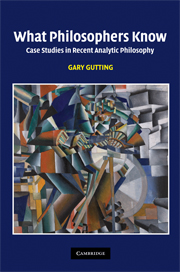Book contents
- Frontmatter
- Contents
- Acknowledgments
- Introduction
- PART I HOW DOES THAT GO? THE LIMITS OF PHILOSOPHICAL ARGUMENT
- 1 Quine's “Two Dogmas”: argument or imagination?
- 2 Argument and intuition in Kripke's Naming and Necessity
- 3 The rise and fall of counterexamples: Gettier, Goldman, and Lewis
- 4 Reflection: pictures, intuitions, and philosophical knowledge
- PART II ARGUMENTS AND CONVICTIONS
- PART III PHILOSOPHICAL TRUTH AND KNOWLEDGE
- References
- Index
3 - The rise and fall of counterexamples: Gettier, Goldman, and Lewis
Published online by Cambridge University Press: 05 June 2012
- Frontmatter
- Contents
- Acknowledgments
- Introduction
- PART I HOW DOES THAT GO? THE LIMITS OF PHILOSOPHICAL ARGUMENT
- 1 Quine's “Two Dogmas”: argument or imagination?
- 2 Argument and intuition in Kripke's Naming and Necessity
- 3 The rise and fall of counterexamples: Gettier, Goldman, and Lewis
- 4 Reflection: pictures, intuitions, and philosophical knowledge
- PART II ARGUMENTS AND CONVICTIONS
- PART III PHILOSOPHICAL TRUTH AND KNOWLEDGE
- References
- Index
Summary
For all their analytic acuity, Quine and Kripke were dealing with a sweeping range of issues that, we might think, make it hard to stay on the narrow path of rigorous argument and call for flights of philosophical imagination or depths of intuitive penetration. Perhaps we should look at a narrower issue that has allowed analytic philosophers to focus their argumentative resources on specific, well-defined points. Here an obvious choice is the search for a definition of knowledge that has occupied epistemologists since the early 1960s. The choice seems particularly appropriate, since epistemology has been driven by what may seem to be the purely argumentative power of counterexamples, which, we have seen, constituted Kripke's most effective use of argument in Naming and Necessity. We begin with Gettier's two famous counterexamples and the debate they spawned over the definition of knowledge, then move to Alvin Goldman's use of counterexamples in his seminal paper, “What Is Justified Belief?,” and conclude with the more complex forms of argumentation deployed in David Lewis' recent but already classic “Elusive Knowledge.”
TWO COUNTEREXAMPLES THAT SHOOK THE EPISTEMOLOGICAL WORLD
Plato, in the Theatetus and the Meno, suggested defining knowledge as justified true belief. Although he himself does not unequivocally endorse the idea and although for centuries the topic was little discussed outside commentaries on Plato, the definition seems intuitively right and earlier analytic philosophers such as Ayer and Chisholm had put forward definitions along its lines.
- Type
- Chapter
- Information
- What Philosophers KnowCase Studies in Recent Analytic Philosophy, pp. 51 - 72Publisher: Cambridge University PressPrint publication year: 2009



